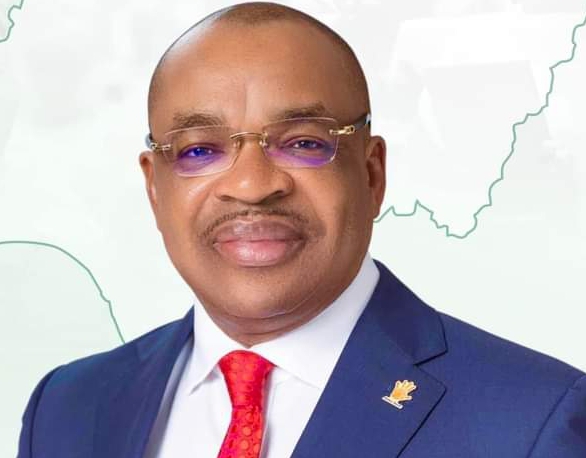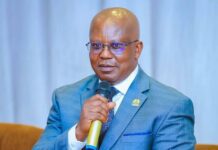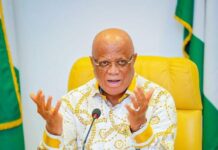Benjamin Jimmy
A few things have changed positively in the education sector in the last four years after the Akwa Ibom State maiden education summit held between 5th and 6th September 2019. There are significant improvements in infrastructure, security in schools, teacher/students ratio, funding, monitoring and supervision. Government’s attention to technical and vocational education has also improved tremendously.
The education summit was of utmost importance to the State. The Governor, Mr Udom Emmanuel, demonstrated how very important the summit was by sitting through from the commencement to the end of the event those two days. That was unusual. It demonstrated the utmost importance he placed on the event. Teachers, parents, students, policy formulators, curriculum experts, all stakeholders in the sector, unions, associations, and political parties were given ample opportunity to make their contributions. At the summit, the government set up a State think-tank committee on education, chaired by Mr Hillary Inyang, an erudite Professor of Geoenvironmental Engineering. The committee came up with a-10 year education roadmap (2020-2030) containing holistic, strategic and foresighted plans, actions, interventions, and timelines. Prof Inyang described the roadmap as a “vision targeted at preparing Akwa Ibom State for the 4th Industrial revolution through education and innovation”. Within the short term, 2020-2024, the committee recommended, improvement in physical infrastructure, equipment and furnishing enhancement, remediation in the teaching and teachers’ welfare, educational programmes and process improvement, etc.
How committed is the Governor towards the implementation of the State’s education roadmap? This is the question this piece seeks to answer.
Despite sitting through and taking copious notes during presentations and interactions at the summit, still some people had the fears that the Governor will not abide himself strictly to the implementation of the education roadmap which was adjudged to be very scientific, original, fresh, comprehensive, explicit, and dependable. There was strong concerns in the public space about the unpleasant state of infrastructure in many public schools. Majority of the 1164 primary and 251 secondary schools in the state were rimmed by very poor infrastructure as was reported in an extensive five parts investigation by Premium Times in 2018, despite interventions by the previous administration.
Governor Emmanuel declared an emergency in the state education sector in January 2021, more than a year after the education summit. The Governor said on 3 January, 2021, “.. .we have declared war on education the same way we declared on healthcare in the state before COVID-19. We have been compiling and we are going to launch out aggressively. We will start with physical infrastructure. We will train teachers. All secondary schools in Uyo must be fenced round beginning from this January and we will provide security men in those schools to protect the facilities….”
The government indeed launched out with positive aggression against poor infrastructure in schools, dearth of teachers, absenteeism and poor attitude to work. Between January 2021 and February this year, the government has renovated more than 800 blocks of classrooms, staff offices, laboratories, assembly halls and libraries in more than 600 primary and secondary schools. New classrooms have been constructed to replace existing ones which are dilapidated beyond remedy. To ensure security in schools, protection of school property from vandals, guard against loitering among students, encroachment on school land and theft, the government commenced perimeter fencing of schools across the State. The acting chairman of the State Universal Basic Education Board (SUBEB), Mr. Iniobong Akpan, said school property including desks, students records, buildings, were stolen, vandalised. After the COVID-19 lockdown, schools complained that they lost valuables to vandals. In one of the secondary schools in Etinan Local Government Area, vandals broke into the principal’s office and carted away whiteboards, students’ registers, office chairs, etc. The Commissioner for Education, Mrs Idongesit Etiebet, said the school perimeter fencing project is aimed at protecting school infrastructure and would cover all public schools in the State. About 50 schools within Uyo municipality were fenced round in 2021. Schools in local government areas like Ikot Ekpene, Onna, Ikono, Obot Akara, Itu, have been covered in the second phase of the school fencing project. The government has improved the provision of books for libraries in some schools and desks for classrooms, even though the desks are not sufficient because of the exponential increase in student’s population in public primary and secondary schools which is above 3.5 million.
READ ALSO : • Udom Emmanuel: Building roads, bridges with indigenous manpower
• How Akwa Ibom State Government is easing access to secondary healthcare
The think-tank had recommended the immediate recruitment and training of 2000 teachers for secondary schools and 3000 teachers for primary schools within the short term. The committee found that there was inadequate number of teaching staff, very high students/teacher ratio (120:1) and its attendant impact on teacher’s health, poorly trained teaching staff, and having teachers assigned to teach subjects they do not have cognate knowledge in. The committee’s recommendation was predicated on a projection that enrolment in nursery, primary, and secondary schools would hit 3.4 million in 2021/2022 from 3.05 in 2019/2020. The recommended employment of 5,000 teachers was to keep the students/teacher ratio at 60:1 in nursery schools, 80:1 in primary, junior secondary and senior secondary schools, and 60:1 in trade schools. The ultimate target is to reach a ratio of 40:1 by 2030. So far, according to data obtained from the office of the Head of Civil Service, the state government has recruited 3000 teachers into primary schools, another 3000 into secondary and has just last month concluded documentation for over 450 persons recently employed as teachers and workshop support staff into the nine technical schools in the State. By surpassing the recommended figure, Governor Emmanuel has clearly demonstrated commitment towards the implementation of the 10 years education roadmap and sticking to the implementation timelines.
The state government has increased funding to public primary and secondary schools in the State. Governor Emmanuel has increased the subvention paid to heads of schools under the free and compulsory education programme from N100 to N150 per pupil in primary school and N200 to N300 per student in secondary school. The state government has continued to pay WAEC and NATEB examination fees for students in all public secondary schools. The Commissioner for Information and Strategy, Comrade Ini Ememobong, said in June last year that the state government spends N800 million yearly as payment for WAEC fees. The Emmanuel-led administration has paid out about N6.4 billion in the last seven years, plus the payment of this examination fee for students. The government has also committed to payment of students’ grant. Recently, the state government dished out full tuition scholarship to 500 indigent, underprivileged students studying in public tertiary institutions in Nigeria for the 2021/2022.
The state government has improved its school monitoring activities. The Ministry of Education has shown more tact in its school monitoring programme under the current Commissioner for Education. Lately, there are improvements in field visibility of education monitors, frequent impromptu inspection of schools, regular meetings with school heads by the Commissioner for Education and other engagements with teachers. These point to one thing: there is a refined determination by the Ministry to get teachers to be in class and teach when they should. The Ministry seriously frowns at truancy and absenteeism among teachers, Mrs. Etiebet said. “From my monitoring experience, Akwa Ibom teachers are most qualified for the job they are employed to do, but what was lacking was commitment and dedication. We are committed to ensure that if you are paid as a teacher, you must deliver, and this can be done through frequent monitoring.
“We have monitoring, inspection and evaluation units in all the Boards (SUBEB, SSEB, STSB). We have to make sure that everyone leaves the comfort of the office to go for supervision. Whoever is doing monitoring must monitor. whoever is doing evaluation must do it well, else we would not get the desired results the governor has asked us to achieve. Nowadays when I visit a school, I go straight to the classroom and if a teacher is not in the class, I would ask the students what subject they ought to be taking at that period, from there I will get to the staff room to look for the teacher handling the subject. This strategy has made teachers stay in class and teach during their period”, the Commissioner noted.
In planning for the future manpower needs of the state’s education sector, the state government has taken very thoughtful and strategic actions. One, it upgraded programmes at the College of Education, Afaha Nsit, to a degree-awarding status, from where it hopes to train teachers for the future. Two, it has remodelled, reconstructed and converted the defunct Government Technical College, Ikot Adaidem, Ibiono Ibom to an intensive skill training institute called the Dakadda Skills Acquisition Centre to encourage entrepreneurship and create a pool for manpower for the technical schools in the State. Consultant on the project, Churchill Udoh, said the centre will run 10 faculties, including civil technologies, mechanical engineering, automobile engineering, ICT, fashion/tourism/hotel management, agriculture, steel fabrication, carpentry and general studies, adding that universities of Lankasta, Lagos, and Uyo have indicated interest to support the faculties. The state government has secured certification from City and Guilds of London, National Board for Technical Education and trade bodies including the Catering Institute of Nigeria, for some of the courses offered at the skills acquisition center. Governor Emmanuel had said during the education summit that he is “looking at a situation where certain categories of skilled labour are produced here and when the need arises for their services, such craftsmen would be fetched here”. One can say that the Governor’s good desire would now be met at the Dakadda Skills Acquisition Centre.
















